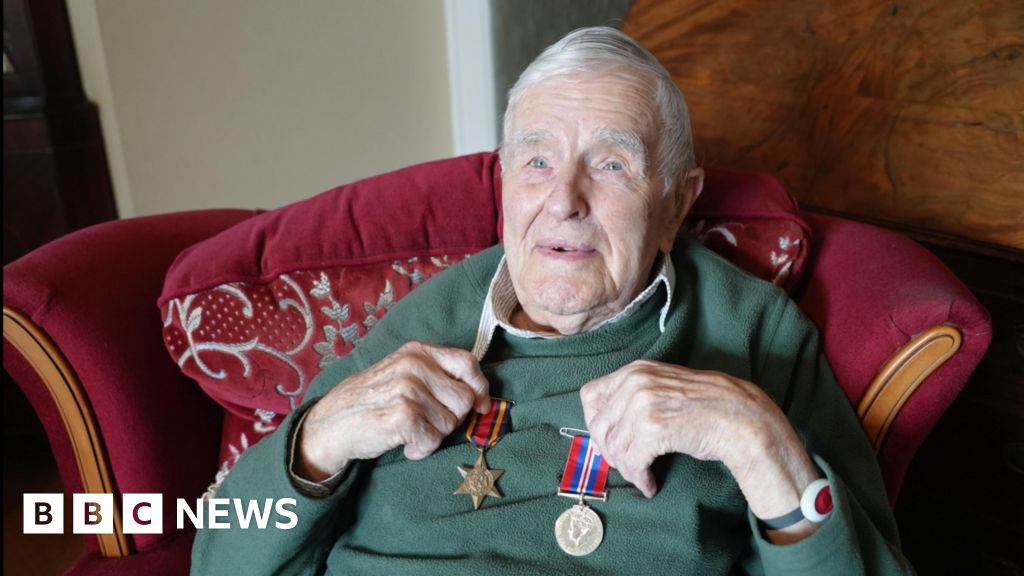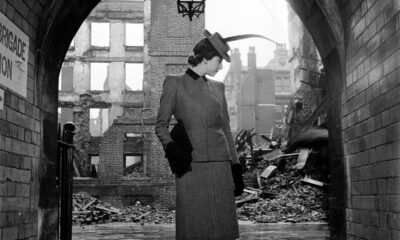Politics
Veteran Recalls Horrors of Hiroshima After Atomic Bomb in 1945

As the world marks 80 years since the end of World War II in the Pacific, Duncan Hilling, a 99-year-old veteran, recalls the harrowing aftermath of the atomic bombs dropped on Japan in 1945. Hilling, who served with the Royal Welch Fusiliers, witnessed the devastation in Hiroshima and Nagasaki, describing the scenes as “absolutely hideous.”
On August 6, 1945, the American B-29 bomber, the Enola Gay, released the bomb known as Little Boy over Hiroshima, unleashing the equivalent of 15,000 tonnes of TNT. This catastrophic event devastated an area of approximately five square miles (13 square kilometers), resulting in an estimated 140,000 deaths among Hiroshima’s population of 350,000. Just three days later, a second atomic bomb was dropped on Nagasaki, pushing Japan to surrender on August 14, 1945.
Personal Accounts of Devastation
Hilling, who joined the Royal Air Force in April 1944 before transferring to the Army, vividly recalls the horrors he encountered. “We went to Hiroshima and saw the horror of the atomic bomb,” he stated. “Blind people were being led around, and there were still dead bodies lying in the streets.” His experiences included visiting schools that had been transformed into makeshift hospitals, where he saw individuals suffering from severe burns and blindness.
Reflecting on the impact, Hilling noted, “The newspapers described an atomic bomb, but it doesn’t describe the people or what they looked like. I really hope it never happens again.” The destruction was immense, with approximately 90% of the houses in Japan being wooden and completely burnt in the attacks.
During his time in Japan, Hilling and his regiment spoke with locals who had survived the bombings. Many could recall only a blinding flash before losing their sight and memories of the event. “They said they didn’t remember anything—just a horrific flash,” Hilling recounted.
Legacy and Recognition
In recognition of his service, Eluned Morgan, the First Minister of Wales, presented Hilling with a letter of thanks at his home. Morgan emphasized the importance of acknowledging the sacrifices made by veterans like Hilling, stating, “He is of course a representative of a whole generation, no longer with us.” She highlighted the necessity of educating younger generations about the costs of war.
Hilling also shared the long-term consequences of the atomic bombs, noting that he lost several comrades years later to cancer after they took “souvenirs” from the bomb sites. “Nobody ever mentioned the fact that radiation was a problem,” he said, underscoring the tragic irony of survival amidst such destruction.
Following Japan’s surrender, a two-day national holiday was declared in the UK, US, and Australia, with millions celebrating the end of the war through parades and street parties. Hilling, celebrating in India at the time, described the excitement of the moment: “We sang Cwm Rhondda, it was very exciting to celebrate it in that way.” He later served in the Malayan Emergency, facing new challenges during a communist-inspired revolt against British rule.
As Hilling’s memories serve as a poignant reminder of the horrors of war, he hopes that future generations will learn from the past to prevent similar tragedies. “It is important that we remind the children of today of the cost of war,” Morgan stated, reinforcing the necessity of listening to the voices of those who witnessed such devastating events.
-

 Entertainment3 months ago
Entertainment3 months agoAnn Ming Reflects on ITV’s ‘I Fought the Law’ Drama
-

 Entertainment4 months ago
Entertainment4 months agoKate Garraway Sells £2 Million Home Amid Financial Struggles
-

 Health3 months ago
Health3 months agoKatie Price Faces New Health Concerns After Cancer Symptoms Resurface
-

 Entertainment3 months ago
Entertainment3 months agoCoronation Street’s Carl Webster Faces Trouble with New Affairs
-

 Entertainment3 months ago
Entertainment3 months agoWhere is Tinder Swindler Simon Leviev? Latest Updates Revealed
-

 Entertainment4 months ago
Entertainment4 months agoMarkiplier Addresses AI Controversy During Livestream Response
-

 World2 weeks ago
World2 weeks agoBailey Announces Heartbreaking Split from Rebecca After Reunion
-

 Science1 month ago
Science1 month agoBrian Cox Addresses Claims of Alien Probe in 3I/ATLAS Discovery
-

 Entertainment2 weeks ago
Entertainment2 weeks agoCoronation Street Fans React as Todd Faces Heartbreaking Choice
-

 Health4 months ago
Health4 months agoCarol Vorderman Reflects on Health Scare and Family Support
-

 Entertainment4 months ago
Entertainment4 months agoKim Cattrall Posts Cryptic Message After HBO’s Sequel Cancellation
-

 Entertainment3 months ago
Entertainment3 months agoOlivia Attwood Opens Up About Fallout with Former Best Friend





















